Everything You Need to Know About Funerals: The Complete Guide
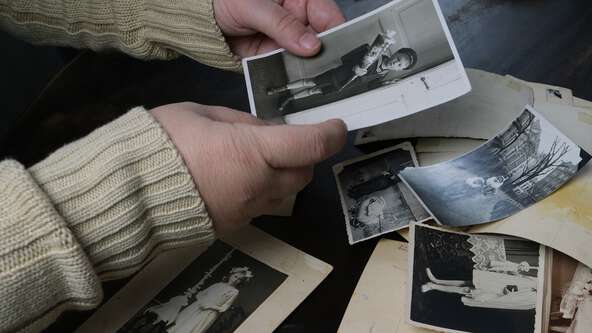
Glossary of Funeral Terms
What Is a Funeral?
What is a funeral? A funeral is both an ending and a beginning. It is a ritual specific to each person’s religious, cultural, and personal identity that concludes the end of someone’s physical life. It is also the beginning of a journey for those left behind: a time to celebrate a loved one’s legacy and passion, a challenge to continue living without them, and a chance to evaluate our own mortality and desire to be remembered when we die.
Bereavement experts recommend some type of ceremony, whether a traditional funeral, an exuberant celebration of life, an impromptu memorial at the beach, or a patriotic tribute to military service. Funeral services are an essential step toward accepting the finality of death and help us start the slow process of letting go of how things used to be.
Maybe you’re reading this because you Googled “funeral home near me,” or similar search words. You might have just lost someone close to you and need to make funeral arrangements. Or you just celebrated a life milestone – wedding, retirement, big birthday – and are thinking about how you want to spend the rest of your life, including when, where, and how you want to say goodbye.
However you arrived at Afterall, we are here to help, guide, and support you. Our online resources are free and available to whoever needs them. (Click here to find one of our locations near you.)
What Are the Most Common Funeral Terms?
Planning a funeral, whether for a loved one or your prearrangements, can feel like learning a different language. What is the difference between interment and burial? Are coffin and casket used interchangeably? Knowing key funeral terminology can make you feel less anxious and more in control during an emotional time.
Here is a glossary of terms and their meanings that you commonly hear when making arrangements or attending a funeral.
Glossary of Common Funeral Terms
Burial: This is the traditional act of placing the deceased's body into a casket and burying it in the ground at a cemetery. But did you know that burial can refer to both conventional burial and the burial of cremated remains? Many families bury an urn holding their loved one's ashes in a cemetery plot.
Interment: A synonym for 'burial,' this term emphasizes placing the body or cremated remains into their final resting place. This could be in the ground, a mausoleum, or another designated area.
Mausoleum: An above-ground resting place where bodies or cremated remains are stored in vaults or crypts. Mausoleums often feature architectural beauty and serene surroundings, providing a peaceful environment for remembrance.
Columbarium: Found alone or within mausoleums, columbaria are built for the specific purpose of housing urns with cremated remains in niches, which can be located on walls or in dedicated spaces within a structure
Casket: A four-sided rectangular box that protects the deceased from natural intrusive elements. Most caskets have a split lid for viewing and handles for carrying. Caskets are made from wood or metal and can be adorned with various materials and designs, reflecting the unique personality or wishes of the departed.
Coffin: A tapered, six-sided container for the deceased and designed solely for burial, not funerals, viewings, or memorials. Although still common in some parts of the world, American funeral homes use caskets instead.
Viewing, Visitation, Wake: The terms "wake," "viewing," and "visitation" are often used interchangeably in many cultures, but they can have distinct meanings based on regional or religious customs.
- Historically, a wake was a vigil held over the deceased, often in someone's home. In some religions, a wake offered the chance to pray and prepare the deceased for burial.
- A viewing refers to the period when the deceased's body is on display so that friends and family can come and pay their respects. The body is typically embalmed and presented in a casket, which may be open or closed.
- Visitation is a more general term for a set time when family and friends can gather, usually at a funeral home, to comfort each other and offer condolences. While a body can be present (similar to a viewing), it's not a strict visitation requirement.
All three terms refer to a time before the funeral when loved ones come together and offer mutual support.
Eulogy: A speech given at the funeral service that celebrates and remembers the deceased's life. Family members, close friends, or religious leaders usually provide the eulogy.
Urn: A decorative container, often customizable, for holding cremated remains. These remains can be kept, scattered, buried, or interred in various memorial spaces. Urns are made from wood, metal, ceramic, porcelain, or biodegradable materials if used for burial in the ground or at sea.
Cremation: Cremation is an ancient and respectful process where the deceased's body is transformed into ashes by applying intense heat. This process provides an alternative to traditional burial, allowing loved ones to keep, scatter, or inter the ashes in a personal and meaningful way.
Embalming: Embalming treats the deceased's body with specific chemicals to preserve its appearance and delay decomposition. It is for viewings or if there's an extended period before the funeral or burial.
Obituary: A written notice announcing someone's death and sharing details of their life and surviving family.
In Memoriam: A tribute phrase used to honor someone who has passed away.
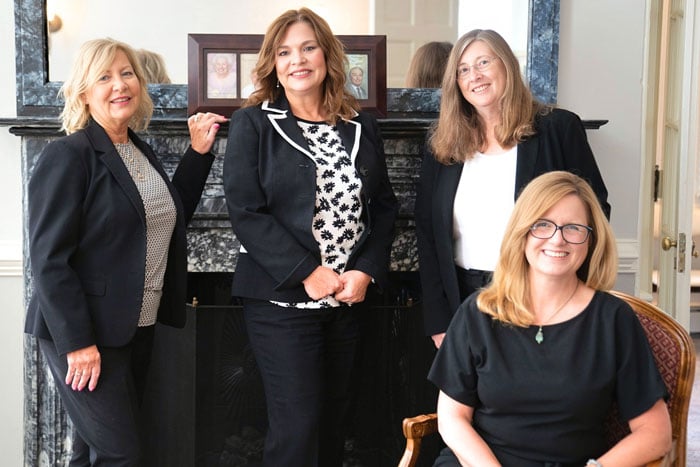
What Are the Roles of Funeral Home Staff?
Funeral home staff members are dedicated professionals who coordinate and oversee various aspects of end-of-life services. Many funeral professionals have a calling to help families who have lost a loved one and need to make arrangements, organize a memorial, or find bereavement resources.
Here is a list of the staff you will likely meet at a funeral home or funeral.
Roles in Funeral Services
Funeral Director: The professional overseeing all aspects of the funeral, from paperwork to the service itself. Most funeral directors have special training and certification as required by the state they serve.
Funeral Attendant: Assists during the service with tasks like setup, guest direction, and transport.
Mortician: Specializes in caring for the deceased, particularly in embalming and restorative procedures.
Undertaker: An older term for someone responsible for funeral arrangements, now often synonymous with “funeral director.”
Crematory Operator: A trained and dedicated professional operating the cremation equipment.
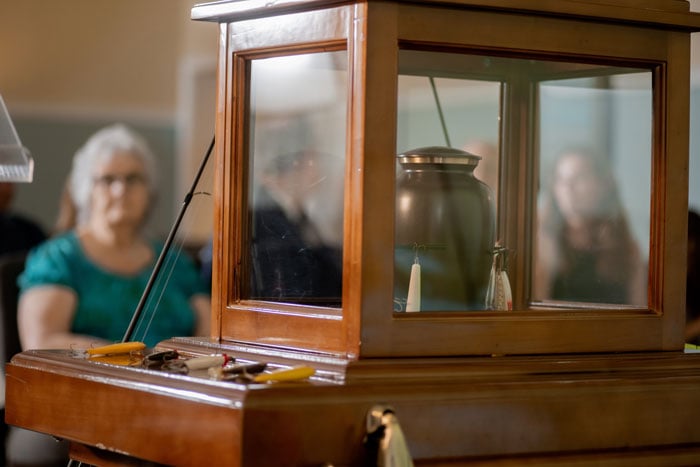
What Is the Difference Between Funerals, Celebrations of Life, and Memorials?
Funerals, celebrations of life, and memorials are all ceremonies that help people come together and remember someone who has passed away. They offer a space for mourning, reflection, and honor. Here's a comparison.
Funerals
Funerals are usually held shortly after the person's death and are a formal ceremony for paying respects. Family, friends, and acquaintances offer mutual support and pay their respects. The casket or urn can be present for viewing and final goodbyes. Funerals are usually structured. You can download funeral or memorial service program templates if your funeral provider does not offer one.
- Generally more somber and structured
- Typically held at a funeral home, place of worship, or cemetery
- May be secular but are often religious, with a spiritual leader, prayers, readings, and rituals
- Could include viewing or visitation, formal service, and burial or cremation
- May have a reception following the service
Celebration of Life
Celebrations of life focus on celebrating the individual's life rather than solely mourning their loss. Celebration of life ideas can have a theme based on someone’s hobbies and passions, such as a favorite sports team or activity. Unlike traditional funerals, life celebrations are not bound to the immediate aftermath of a death, so they do not include a casket (but might have cremated remains in an urn on display).
- More uplifting and informal
- Can be secular or religious
- Might have a particular theme based on the loved one’s life, hobbies, or passions
- Can be held anywhere: homes, parks, the beach, community centers, or a destination location
- Usually more personalized with music, food, and personal belongings
Memorials
Memorials focus specifically on honoring and remembering the life of a loved one. Unlike funerals, memorials do not require the presence of the deceased's physical remains. They can occur weeks or even months after the person has passed away.
- Tone depends on the family’s wishes, from reflective to uplifting
- Can be held anytime, including anniversaries or special occasions
- Might have religious elements
- Program might include readings, personal stories, or a dedication to a permanent memorial
- Can take place at many locations, including places of worship, parks, private homes, or community center
Deciding Which Farewell Is Right for You or Your Loved One
There is no "right" or "wrong" choice between a funeral, memorial, or celebration of life. Each option offers a unique way to pay tribute to your loved one's life, and what truly matters is finding a ceremony that best reflects their wishes and personality.
Here are a few tips to help guide you through this decision-making process.
Consider your loved one’s wishes and personality: Did they have any specific wishes or preferences about how they wanted to be remembered? Did they express a desire for a more solemn or celebratory gathering? If you examine their life, profession, hobbies, or beliefs, you will likely hit on a service that best suits their memory.
Talk to family members and friends: If your loved one did not specify their wishes, have an open and honest dialogue with close friends and family members for their perspectives. Together, you are likely to find the balance between honoring their life and offering the family an authentic way to say goodbye.
Remember the practical considerations: Your decision should also consider timing (for those traveling from out of the area), location, and budget. Funerals are often held shortly after the passing of a loved one and may involve specific religious or cultural practices. Celebrations of life and memorials are less time-sensitive and can provide a more personalized and convenient option.
Reflect on the emotional needs of family and friends: Consider the needs and preferences of family members, close friends, and other attendees who will be present at the ceremony. Does a more formal and structured funeral provide a sense of closure and comfort for those grieving? Or would a celebration of life bring more solace by focusing on the joyous memories shared?
Seek guidance from a trusted funeral professional: Funeral professionals are experienced in supporting families through decision-making and can provide valuable advice and resources. A funeral director or arranger can help you explore the available options and create a meaningful ceremony while respecting your timetable and budget.

How to Personalize a Memorial Service
Your loved one was unique, so their memorial service — whichever format you choose — should reflect their essence. By infusing the ceremony with personal touches that resonate with the deceased's personality, passions, and life story, you honor their memory with an intimate and heartwarming experience. Personalizing their memorial transforms a generic event into a vivid, authentic tribute, a rich tapestry of memories, love, and legacy.
Here are some ideas to personalize a loved one’s memorial.
- Photos and videos: Create a slideshow or montage capturing moments from the deceased's life.
- Music: Create a funeral songs playlist with their favorite tunes, genres, hymns, and songs that capture their spirit.
- Funeral flowers: Display their favorite or a flower that reminds you of them.
- Personal items: Display personal belongings, hobbies, or crafts that represent them.
- Stories & anecdotes: Invite attendees to share personal stories and memories.
- Theme: Consider a theme based on their passion or interest, such as nature, art, film, sports, or travel.
- Decor: Use their favorite colors or symbols in decor elements like flowers and banners.
- Memorial tokens: Distribute keepsakes, such as personalized bookmarks, pins, or seeds to plant in their memory.
- Special rituals: Include cultural or familial traditions or create a new ritual like candle lighting.
- Location: Choose a place significant to the deceased, like a favorite park or beach.
- Dress code: Suggest attendees wear a particular color or style representing the deceased's favorites or personality.
Should You Have a Religious or Secular Funeral?
Deciding between a religious and secular funeral is a deeply personal decision, shaped by various factors, including your loved one’s beliefs and your family's wishes. Understanding the nuances of each can help families navigate this essential part of the mourning process.
Differences in Ceremonies
Religious funerals are rooted in spiritual traditions and often follow specific religious rites and rituals.
- A religious leader officiates, such as a priest, imam, rabbi, or monk.
- The ceremony includes prayers, hymns, readings from sacred texts, and rituals specific to that religion (e.g., the Christian rite of committal or the Jewish tradition of reciting the Kaddish).
- Religious funerals are also rich in symbolism that adhere to specific customs, such as a white cloth covering the casket to symbolize baptism.
- Family members and guests might also wear special items or certain colors. In Hindu funerals, mourners wear white, not black.
Secular funerals focus on celebrating your loved one’s life without adhering to religious rituals.
- They can be led by a celebrant, family member, or close friend. Readings can range from poetry, such as the famous “dash poem,” to excerpts from literature or personal letters.
- Music choices are often favorite songs of the deceased or tracks that evoke memories.
- Symbols and attire are flexible, reflecting the deceased's and their family's personal tastes and preferences.
Considerations for Interfaith Services
Interfaith services bring together elements from multiple religious traditions, accommodating the beliefs of mixed-faith families.
- If you plan an interfaith funeral, consider having multiple officiants representing different faiths. This is a considerate way to collaborate while respecting each faith’s traditions and values.
- Since you cannot include all the elements of both faiths, prioritize the most important rituals, readings, or songs.
- Opt for a neutral location or one open to interfaith ceremonies.
The essence of a funeral is to honor the deceased and comfort the grieving. Whether religious, secular, or a mix, the ceremony should reflect your loved one’s life, values, and beliefs.
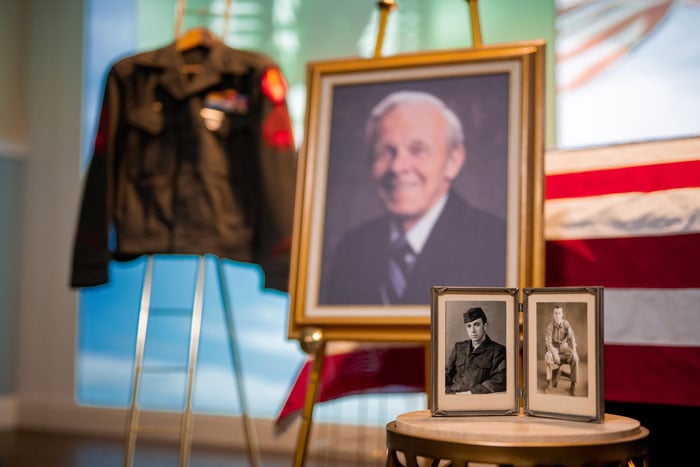
What Benefits Are Available for a Military Funeral?
Whether they served in wartime or peace, as enlisted service members or officers, America’s veterans deserve special recognition for their commitment to our country. Honorably discharged veterans who completed the required duty period may be entitled to a wide range of burial, cremation, and memorial benefits through the Veterans Administration (VA). Spouses and minor children may also qualify for certain burial benefits. You can use these benefits to plan a military funeral, including a veteran’s headstone, honor guard, and burial in a national veteran’s cemetery.
Who Is Eligible?
You are likely entitled to burial benefits if any of these conditions apply:
- A veteran who departed from the service on conditions not classified as dishonorable.
- A member of the Selected Reserve discharged due to disability (either aggravated by service or occurred on duty).
- An individual enlisted for at least one term in Selected Reserve and departed on conditions not classified as dishonorable.
- A spouse or minor child of a veteran (currently living or not).
- In specific situations, an unmarried adult dependent child of a veteran.
- Other eligibility as determined by the VA for particular groups or in times of war.
What You May Receive
Depending on your qualifying status, you could receive one or more of the following military funeral benefits:
Benefits and Honors
- Burial flag: The family is given an American flag as a tribute from the nation
- Honor guard: A team of military members that might perform rituals like presenting the flag, playing “Taps,” or doing a gun salute, where rifles are fired into the air in tribute
- Burial and related allowances for:
- Burial, cremation, and funeral costs
- Plot or interment allowance for gravesite or interment in a state, tribal, or private cemetery
- Transportation reimbursement for transporting casket or cremated remains to a final resting place
- Transportation allowance for transporting a veteran to a national cemetery
Benefits in National Veterans Cemeteries
- Burial spot: Eligible veterans and sometimes their families can be buried in National Veterans Cemeteries.
- Markers and headstones: Qualifying veterans receive a marker or headstone with their name and service details (branch of service, unit, rank, etc.)
- No cost: There's no cost for the burial, the plot, or the headstone for those who qualify.
- Niches: For those who choose cremation, there are special niches where the ashes can be placed.
Planning and Personalizing a Military Funeral
For preplanning arrangements, only one form may be sent to the VA prior to death. This is the form to determine if a veteran (or family member) is eligible for burial in a VA national cemetery. You cannot reserve a space in a national cemetery but can prequalify for this honor. All other forms may be prepared ahead of time but are not accepted until after the time of passing.
Planning a military funeral ahead of time can reduce stress during a time of grief. Here are some ideas to create a truly unique memorial for a former service member:
Arrange for military honors: Coordinate with the appropriate military branch to arrange for traditional military honors. This may include a flag-draped casket, a color guard, or playing Taps.
Display their military accomplishments: Create a table showcasing their medals, ribbons, or other military awards. Include photographs or mementos from their time in service.
Tell their story: Share anecdotes, accomplishments, and their contributions to the military community in a eulogy, video, or photo montage.
Involve fellow veterans or service members: Reach out to local veterans' organizations or active duty service members who may be willing to participate in the funeral service. Having fellow veterans or current military personnel present can be a touching tribute.
Play meaningful music: Choose songs that were meaningful to them during their service. Music has a way of stirring emotions and can create a touching atmosphere.

How Do You Arrange a Burial?
It’s natural to feel overwhelmed to make burial arrangements for a loved one. Realistically, selecting a funeral home, buying a casket, and picking a cemetery are unfamiliar tasks for most people. Fortunately, a licensed funeral provider has the experience, resources, and knowledge to help you make an informed choice. Funeral directors handle the paperwork, transportation, and coordinate burial preparations. Burials usually take place within a few days of passing.
You might not think you have options when making burial arrangements, but you actually have several choices. Think about your loved one’s wishes and personality and what your budget can handle. A reputable funeral home is open and transparent about its prices and must make a General Price List available to you. This is a written breakdown of their memorial items, professional services, and elements required by local or state laws. Understanding what things cost and what services you will receive ensures that you purchase only what you want and need.
Traditional Burial Options
Plot Type
- Single graves: For individual burials
- Companion graves: For couples or close companions
- Family plots: Designated areas for multiple family members
Headstone
- Materials range from granite to marble
- Many options for design, symbols and inscriptions
Casket
- Materials: Ranging from hardwoods (like oak, maple, or mahogany) to metals (like bronze, copper, or stainless steel). Many caskets offer customization options, such as religious symbols or the loved one’s name
- Interior: Varies from simple linings to plush velvet
- Seals: Some caskets offer protective seals to keep water and other elements out
- Eco-friendly: There are also biodegradable options suitable for green burials
- Vaults or liners: Exterior containers made of concrete or metal to encase the casket and prevent the ground from sinking
Green Burials
Green burials offer a sustainable burial approach to reduce environmental impact.
- Natural cemeteries: Graveyards dedicated solely to green burials that do not incorporate vaults, non-biodegradable materials, or embalming fluids
- Biodegradable caskets: Crafted from materials like bamboo, wicker, or untreated wood to naturally decompose without harming the soil or water
- Natural markers: Rather than traditional headstones, graves might be marked with a tree, shrub, or engraved rock
Finding a Cemetery
Before you add the task of finding a cemetery and burial spot, determine if your loved one already has a family plot or gravesite. Qualified veterans can be buried in a national VA cemetery. Some houses of worship have a cemetery, which would ensure your loved one is buried according to their faith. You can also ask religious leaders, family, or friends to recommend a reputable cemetery. Your chosen funeral home can recommend a cemetery – some funeral homes even own and operate their own.
Before you select a cemetery:
- Research online and read reviews and ratings.
- Visit in person to understand the ambiance, landscaping, and professionalism.
- Consider and compare the cost of maintenance and any limitations the cemetery might have (for example, some prohibit artificial flowers left on graves).

Funeral Expenses
Do you know if your loved one made funeral prearrangements? Depending on their age and the circumstances of their death, they might not have set aside funds to pay for a burial or a funeral. Younger adults tend not to think about funeral expenses, and not all older people set aside funds to pay for a burial. If prepaid funeral arrangements are not an option, there are still ways to make funeral expenses more affordable.
Life insurance: Your loved one’s life insurance could apply to funeral expenses. They might have other assets that could pay for burial.
Direct burial: This streamlined service bypasses embalming and viewings, making it more cost-effective.
Special discounts: Some funeral homes offer discounts to families of first responders, educators, and former service members.
Places of worship: Your church, synagogue, mosque, or other place of worship may have funds to help pay for members’ burial expenses.
Veterans or government assistance: Some municipalities or veterans' services provide financial assistance for burials or offer dedicated spaces for those who qualify.
Crowdfunding: When death is unexpected, some families start a GoFundMe account or similar fund-raising platform where family, friends, and the public can donate to help pay for funeral expenses.
Compare prices: Prices vary significantly depending on your chosen products and services. It is not unseemly to compare costs before you make a decision. Many funeral homes have prices online, so you do not have to drive around town to comparison shop.
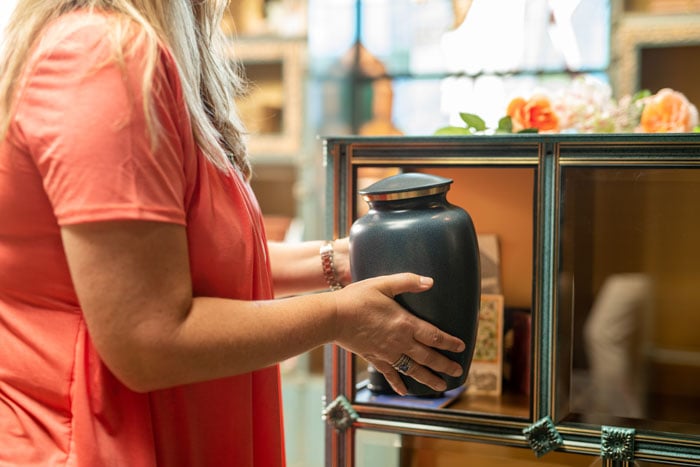
Is Cremation the Right Choice?
For many years, most American families chose burial over cremation. That trend has shifted, with a majority of individuals opting for cremation. However, there is no right or wrong answer. Unless your loved one had specific wishes for burial, you should know that cremation is a dignified and more affordable alternative. You may have a traditional funeral service with a viewing or visitation. You actually have more options for what to do with the remains than a traditional in-casket burial.
Understanding the cremation process can help you make an informed decision that is right for you, your family, and your departed loved one.
What Is Cremation?
Cremation has been a method of final disposition for the human body for thousands of years. After a cremation or funeral home completes the necessary paperwork (usually a few days after passing), the deceased's body is placed inside a container within a cremation retort. Contrary to some falsehoods, the body is not directly exposed to the flames. After three or four hours of intense heat, the deceased’s body transforms into bone fragments and other matter. The remaining fragments are processed further to produce a fine, sand-like consistency called ashes.
Direct Cremation
Direct cremation (sometimes called simple cremation) is the most basic form of cremation. Direct cremation does not include any preparation or preservation. Your loved one is collected, the cremation occurs without witnesses, and the ashes are returned to you in a simple container. Because there are no precremation services, direct cremation is the most affordable option for families.
Burial vs. Cremation
Compare the differences and similarities between burial and cremation.
Affordability
Burial typically costs over $9,000 in the U.S., including transportation, embalming, casket, burial vault, and burial plots. A full traditional cremation, with a memorial service, averages $6,000, while direct cremation costs around $2,300. Your burial or cremation arrangements could cost less or more, depending on the options and services you select.
Timeframe
Burials usually happen within a week of passing, necessitating quick planning and potentially stressful for families, especially those needing to travel. Cremation offers a more relaxed timeline. With direct cremation, families determine the memorial's timing without external pressure.
Memorial Flexibility
Traditional funerals with burial have a preset sequence of events and a fairly rigid timetable, which might comfort some but feel restrictive to others. With cremation, you may choose a memorial as traditional as burial, with caskets available for rental, embalming, and cosmetology. However, without the pressure of preserving or burying the deceased’s body, cremation allows you to schedule a memorial when, where, and how it feels right for your family.
Final Resting Place Options
For burials, final resting places are restricted to legal burial sites. With cremation, the possibilities are vast. Ashes can be buried in cemeteries, columbariums, urn gardens, or traditional plots. Ashes can also be scattered in significant places, kept in urns, transformed into jewelry or other touchable keepsakes, and more.
Environmental Concerns
Some families opt for cremation for environmental reasons. As our population grows, land availability in places shrinks – land that could be used for housing, schools, and natural green spaces. Traditional burial plots take up far more space than columbariums. There is also concern that embalming fluids have a negative impact on soil and groundwater. However, flame cremations produce carbon, which also harms the environment. Some funeral providers and crematoriums purchase offsets to reduce their carbon footprint.
Religious Beliefs About Cremation
For centuries, major world religions discouraged or prohibited cremation for followers. Today, many denominations are more accepting of cremation. Reform Jewish rabbis will conduct funerals before cremation, and Catholics and Protestants are also more lenient.
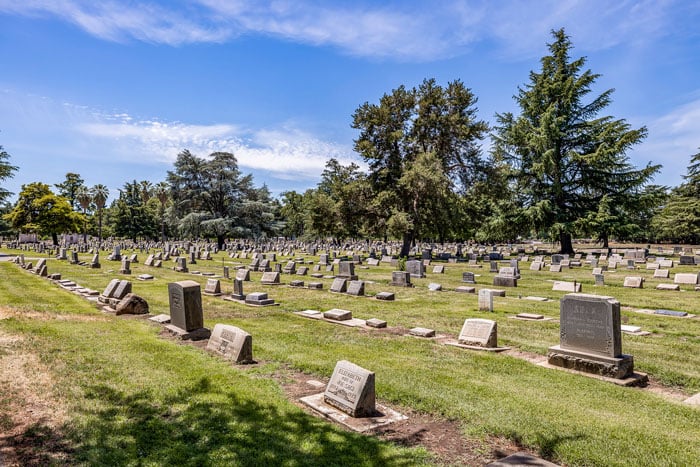
Are Headstones and Other Permanent Memorials Just for Burial?
After cremation or burial, you can select a permanent memorial for a loved one. Visiting their final resting space comforts many people, and cemeteries offer a beautiful, peaceful respite with trees, flowers, and grass. You can also begin (or continue) a family tradition with a private area or estate for your children or grandchildren.
Although in-casket burial limits your options to ground burial or an above-ground mausoleum, you have nearly unlimited options for customization.
Headstones, Monuments, and Markers
Headstones are stone slabs set at graves, inscribed with personal details and sentiments. They're typically made from materials like granite or marble. While headstones are direct markers for graves, monuments are larger structures, like statues or obelisks, often commemorating multiple family members. Markers, more subdued, are flat structures at ground level and are commonly used in modern cemeteries.
Cremation Urns and Columbarium Niches
As cremation gains popularity, urns, and columbarium niches have become integral to memorialization. A columbarium is an edifice with niches (small spaces) to hold urns. These niches offer a designated, respectful place for the ashes, allowing families a physical location to visit and remember. You can choose from many different styles of urns, and options such as a glass-front niche let you include a photograph or small mementos of your loved one.
Memorial Gardens
Memorial gardens are designated cemetery sections with beautiful landscaping and water features, such as ponds or fountains. They are spaces where nature's beauty is a living tribute, with each plant symbolizing growth and life. Some gardens incorporate cremation niches or inter remains within pedestals, benches, and other statuary.
What Do You Do with a Death Certificate?
Death certificates are legal proof of someone’s passing. Without a certified death certificate, you cannot complete the necessary tasks to settle a loved one’s estate, whether closing a bank account or applying for Social Security benefits. You will need several copies to prove someone’s death to insurance carriers, credit card companies, banks, the VA, and more.
How To Get a Death Certificate
Although the exact process varies depending on the jurisdiction, deaths must be registered with the local or state registrar or vital records office within five days or sooner. Usually, the funeral home, cremation service, or mortuary will prepare and file the death certificate. Some counties issue a “pending” death certificate so the funeral home or cremation service can proceed with final disposition without further delay.
Afterall funeral homes and cremation providers can order death certificates for you at the same cost you would pay if you requested them from the county. Most people prefer to let their funeral provider take care of this task for them since it can be time-consuming and emotional.
Death Certificate Timeline
The processing time for a death certificate can range from several days to many weeks, depending on the state or county issuing agency. Some jurisdictions offer expedited services for an additional fee. While most funeral providers order death certificates for you as part of their service, they cannot control how long it takes the state or county to issue, process, and mail them.
What Should LGBTQ+ Individuals Consider When Planning a Funeral?
As society progresses, it's our collective duty to ensure that the rites of passage, like funerals, are inclusive, compassionate, and representative of our diverse world. LGBTQ+ individuals feel pain, sorrow, and the heartbreak of loss like anyone else. Their relationships, friendships, and connections are just as deep and meaningful. Yet many LGBTQ+ relationships and identities are often marginalized or dismissed. A funeral for an LGBTQ+ individual should be an authentic and formal acknowledgment of someone’s life, legacy, relationships, and community contributions.
Respecting LGBTQ+ Identity and Relationships
If you plan a funeral for an LGBTQ+ loved one, you want to maintain recognition and respect for their unique experiences and identity. Here are some considerations:
Use preferred pronouns and names: Ensure the individual's preferred name and pronouns are used throughout the funeral service and on permanent memorials. This respect for their chosen identity can be a source of comfort for those in mourning.
Include significant relationships: If the deceased was in a relationship, whether it was legally recognized or not, it's important to acknowledge and include their partner in the funeral process, giving them the same regard as one would to any spouse or partner.
Represent their truthfully: Portray the deceased's life, experiences, and contributions truthfully, ensuring that their LGBTQ+ identity is recognized without it being the sole focus. Celebrate their achievements, memories, and relationships holistically.
Challenges and Solutions in LGBTQ+ Funeral Planning
Potential family conflicts: There may be situations where the deceased's biological family might not acknowledge or accept their LGBTQ+ identity. In these instances, a funeral director can mediate, ensuring your loved one’s wishes and identity are respected.
Legal issues: In places where LGBTQ+ rights are not fully recognized, there might be legal challenges concerning the deceased's assets, property, or custody matters. Contacting an LGBTQ+ advocacy group or legal professional knowledgeable about these issues can be beneficial.
Cultural and religious sensitivities: Some cultures or religious practices may not accept LGBTQ+ identities. However, funeral professionals can help you find a middle ground, creating a ceremony that respects your loved one’s identity and cultural or religious beliefs.

What Is Funeral Etiquette?
If you never attended a funeral before, it might feel overwhelming. What should you wear? What do you say to the family? Funeral etiquette is guidelines for respectful manners and behavior at a funeral, memorial, graveside service, or life celebration. These guidelines can also make you feel more at ease about your role.
Who Should Attend?
Attending the funeral is usually appropriate if you are close to the person or their family. Funerals are typically open events, allowing anyone to attend. However, if the funeral is private and you haven't received an invitation, it's important to respect the family's wishes and not attend. Remember, the funeral is about honoring the deceased and supporting the family.
When Is It Okay To Skip?
There are valid reasons to skip a funeral, such as living far away, work obligations, illness, private services, or the potential to disrupt the immediate family. If you can't attend, find other ways to offer support or condolences.
Should You Bring Your Kids?
Deciding whether to bring children to a funeral is a sensitive and personal decision. Consider their age and maturity, their relationship with the deceased, cultural or religious considerations, and the emotional impact it may have on them. If you choose not to bring your children, provide alternative arrangements during that time, such as a trusted caregiver or family member looking after them.
What Should You Wear?
Dressing conservatively in black or neutral colors is generally a safe choice unless the family's cultural or religious customs dictate otherwise. Choose comfortable clothing appropriate for the occasion and climate.
How Should You Prepare for the Service?
Participate in the funeral when appropriate, but only do what you're comfortable with. Respect the family’s religious and cultural beliefs, even if you choose not to participate in all practices, prayers, or rituals. Silence or turn off your cell phone and other devices.
Do You Have to Attend the Funeral and Interment?
Attending the funeral and interment is a personal choice. Some graveside services may be limited to family members, close friends, and clergy. Paying your respects at the funeral and skipping the graveside service is also acceptable.
What Should You Say to Grieving Family Members?
Save lengthy condolences or conversations for after the service and focus on comforting the grieving family at the moment. Expressions of support with good intentions are appreciated. Keep your words brief and respectful.
Should You Bring or Send Flowers?
Sympathy flowers are common gifts, although some families may request charitable donations instead. If you send flowers, ensure they arrive before the service so the funeral home staff can arrange or display them properly.
What Is a Living Funeral?
A living funeral, as its name suggests, is a celebration of life held while the person being honored is still alive. Rather than waiting until after their death to gather family and friends for remembrance, the individual can be present, hear the eulogies, witness the outpouring of love, and even address the attendees. For some, it’s an opportunity to give thanks, share wisdom, or offer apologies. For others, it’s a space to provide closure, especially if they have a terminal illness and want to prepare their families for their imminent departure.
Benefits of a Living Funeral
Emotional catharsis: Traditional funerals can be fraught with regrets, with attendees wishing they could have expressed their feelings or shared stories with the deceased. A living funeral eliminates these regrets, allowing real-time sharing and emotional healing.
Closure: For the terminally ill, living funerals offer a space to say final goodbyes, share essential life lessons, or even provide guidance on lingering matters.
Empowerment: Planning one's living funeral can be an empowering experience. It gives the individual agency over how they wish to be remembered and how they want their life celebrated.
Unity: Such events can bring together divided families or distant friends, acting as a catalyst for reconciliation and bonding.
Planning a Living Funeral
If you or a loved one is considering a living funeral, here are steps to ensure it's a meaningful event:
- Understand the core reasons for hosting the event. Is it for closure, reconciliation, celebration, or all of the above?
- Decide on a practical and meaningful location – a home, a park, a community center, or any place that resonates with the individual's life.
- Who should attend? Close family, distant relatives, friends, colleagues? Remember, the goal is to create a space of love, so invite those who matter most.
- Decide on the event’s flow. Will there be eulogies? Music? Shared meals? Or perhaps a ceremony specific to the individual's spiritual beliefs?
- Ensure invitees understand the purpose and nature of the event so they come prepared emotionally.
- Consider recording the event. It will be a cherished memory for the attendees and a priceless memento for future generations.

What Role Does Hospice Have in Funeral Planning?
Many milestones punctuate life's journey, but the end is one of the most poignant. The concept of death, while a natural progression of life, can be overwhelming and emotionally charged for the individual passing and their loved ones. This is where hospice care plays an integral role in end-of-life care, funeral planning, and grief counseling.
Role of Hospice in End-of-Life Care
Hospice is a specialized care tailored to those with life-limiting illnesses. Rather than focusing on curing the illness, hospice care prioritizes providing comfort, pain management, and emotional support. A dedicated team of professionals, including nurses, doctors, social workers, and spiritual advisors, work collectively to meet the patient's physical, emotional, and spiritual needs.
Depending on the patient's preference and condition, care can be provided at home, in a hospice facility, or a nursing or assisted living facility. This flexibility enables the patient to be in a setting where they feel most comfortable, surrounded by familiar and cherished items and loved ones.
Preparing for the End
One of the unique facets of hospice care is its approach to preparing the patient and their loved ones for the end. Hospice caregivers often collaborate with local funeral homes and can provide resources and advice to families during this planning phase. By discussing and deciding on the details in advance, families can experience a sense of relief, knowing that they are fulfilling their loved one's wishes.
Grief Support
The end of a loved one's life is just the beginning of the grief journey for those left behind. It is natural to feel anticipatory grief as you prepare for the inevitable. Hospice bereavement counselors assist families in their grieving process, offering one-on-one counseling, support groups, and workshops. Counselors help individuals process their emotions and move toward acceptance and healing by providing a safe space to share feelings and memories.
When Is the Right Time to Plan Ahead?
The answer is simple: now is the best time to plan ahead. It is natural to feel hesitant when approaching the topic of end-of-life arrangements, and we often push it to the back of our minds. But the unfortunate reality is that death is inevitable, and proper planning can make a significant difference for those we leave behind.
One of the most important reasons to plan ahead is to bring a sense of peace of mind to your loved ones. Perhaps you’ve experienced the stress, uncertainty, and financial burden when someone passes away unexpectedly and does not leave any direction or instructions.
Most people prefer not to inflict this distress on their family members. You should also have the end-of-life arrangements you want, not what others might choose.
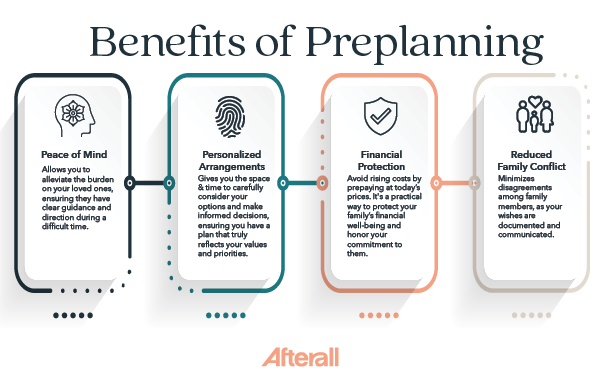
Benefits of Preplanning
Peace of mind: Preplanning allows you to alleviate the burden on your loved ones, ensuring they have clear guidance and direction during a difficult time.
Personalized arrangements: Making your funeral arrangements gives you the space and time to carefully consider your options and make informed decisions, ensuring you have a plan that truly reflects your values and priorities.
Financial protection: By prepaying for your end-of-life arrangements at today's prices, you can avoid rising costs. It's a practical way to protect your family’s financial well-being and honor your commitment to them, even after you're gone.
Reduced family conflicts: A preplanned arrangement can minimize disagreements among family members, as your wishes are documented and communicated.
How Can I Financially Plan for a Funeral?
Planning for end-of-life arrangements is a topic often met with mixed emotions. While it may be challenging to discuss, it is essential to understand the costs associated with funerals. Acknowledging and preparing for these expenses can provide you and your loved ones with financial security and peace of mind during a challenging time.
Funeral Insurance
The primary benefit of funeral insurance (also called burial insurance) is that it provides immediate financial assistance to your loved ones when they need it most. Having a funeral insurance policy can alleviate the financial burden on your family during an already emotionally difficult time. This insurance ensures that your loved ones can honor your final wishes without worrying about how to pay for the expenses.
Funeral Insurance Covers These Funeral Expenses:
- Burial or cremation
- Memorial service
- Casket or urn
- Transportation
- Other associated costs
Funeral insurance provides a lump sum payment upon the policyholder's death. It is typically easy to obtain and affordable. You usually do not need a medical exam to qualify.
Setting Aside Savings
Another option for managing funeral costs is setting aside savings earmarked explicitly for end-of-life arrangements. By creating a separate account or investment specifically for this purpose, you can steadily grow the funds over time, allowing them to accumulate and cover future funeral expenses. Determine how much you can comfortably contribute to this fund regularly. While it may take time to build a significant amount, even small contributions over the years can add up and make a difference.
Types of Interest-Bearing Savings Accounts
- Traditional savings accounts: A basic type of interest-bearing account allows individuals to save money while earning interest on their deposits.
- High-yield online savings accounts: Online savings accounts offered by financial institutions typically offer higher interest rates than traditional savings accounts.
- Money market accounts: Interest-bearing accounts usually require a higher minimum deposit and offer competitive interest rates based on market conditions.
- Certificates of deposit (CDs): Time deposits that require individuals to deposit a specific amount of money for a fixed period, often with higher interest rates compared to traditional savings accounts.
These are just a few examples. You might want to consult a professional financial planner or banker to choose the savings plan that works for you.
Prepaid Funeral Arrangements
Prepaid funeral arrangements involve making financial arrangements for your funeral in advance. This option allows you to plan and pay for your funeral services at today's prices, effectively protecting yourself and your family from rising costs in the future. Prepaid funeral plans also let you specify whether you want burial or cremation, what type of memorial service (if any), and where you want your final resting place.
Prepaid funeral arrangements are a personal choice and should be made after careful consideration and research. Review the contract carefully, seeking clarification for any uncertainties or concerns you may have. Additionally, keep your loved ones informed of your arrangements and where the necessary documentation can be found.
Benefits of Prepaid Funeral Arrangements
Personal empowerment: Prepaid funeral arrangements give you control over your final wishes. Your family will have clear instructions for the kind of farewell you want.
Payment plans: Many reputable providers offer payment plans to make preplanning more affordable and accessible. Payment plans allow individuals to divide the cost of their funeral services into manageable and predictable payments over time.
Hedge against rising costs: By prepaying for your funeral expenses, you protect yourself and your family from future increases in funeral costs. Prepaid funeral arrangements typically cover a burial plot or cremation niche, casket or urn, transportation, embalming, cremation fees, and the memorial service.
Security: With prepaid funeral arrangements, your money is protected and held in a secure account until it is needed for your funeral. This ensures that the funds allocated for your final arrangements are available and safeguarded.
Restricted access: When you make prepaid funeral arrangements, no one can access your funds until they are required for your funeral. This provides an added layer of security and ensures that the funds are used for their intended purpose.
Honor guarantees: Reputable providers of prepaid funeral arrangements often offer guarantees to honor the services and items you have selected and paid for.
What Happens When Someone Dies Abroad?
Every year, thousands of Americans travel overseas. Unfortunately, some visitors die from natural causes, car accidents, or other reasons. Planning for the possibility of death while traveling can be an uncomfortable topic, but it could happen. In a recent year, the U.S. Department of State recorded over 700 American deaths in foreign countries. And while you could arrange for burial or cremation overseas, most of us want our loved one’s remains safely returned home.
Most people travel with friends or family, who have a responsibility to report the passing of a loved one to the local authorities and the U.S. embassy or consulate in the country where the person passed away. However, if you're traveling alone or your companions are unaware of the situation, it's up to the local authorities to identify you and alert the consulate.
Government Assistance for American Citizens Abroad
The Bureau of Consular Affairs assists American travelers abroad. When an American dies overseas, the Bureau can:
- Provide diplomatic assistance to the deceased person’s travel companions abroad or family members in the U.S.
- Locate and inform the next-of-kin
- Contact local authorities, including the police or other agencies
- File a local death certificate and a Consular Report of the Death of an American Abroad
- Provide legal guidance and language translation services
- Arrange for the safe transfer of your loved one’s personal property, including money, clothing, and jewelry
What the Bureau nor the federal government can not do:
- Arrange for cremation or burial overseas
- Arrange and pay for transporting your loved one’s remains home
- Pay for visas, permits, and embalming
Out-of-Area Protection Plans
Travel insurance is excellent for covering the cost of an unexpected delay or cancellation, but it does not pay for bringing a loved one’s remains home from overseas. An out-of-area protection plan is a one-time investment designed to cover the legal and logistic challenges when a loved one dies away from home. Planning for the unexpected today can save your loved ones from additional expense and stress during mourning.
Taking Control of Your Future
Few people are comfortable making funeral arrangements for a loved one or considering their inevitable demise. Yet talking about end-of-life arrangements can help diffuse our anxiety and fear. We hope our complete guide to funerals gives you clear, actionable steps that bring comfort and empowerment.
Remember, by planning ahead, you can ease the burden on your loved ones and ensure your legacy reflects who you are. If you want to learn more or are ready to take the first step, please contact one of our location funeral homes.